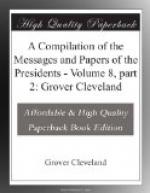the United States and to the welfare of its citizens,
I may do you the favor to send you an answer as early
as possible. I can now assure your excellency
that His Catholic Majesty has not hitherto issued
any order for suspending the deposit, and consequently
has not designated any other position on the banks
of the Mississippi for that purpose. But I must
inform you, in answer to your inquiry, that the intendant
of these provinces (who in the affairs of his own
department is independent of the general Government),
at the same time that, in conformity with the royal
commands (the peace in Europe having been published
since the 4th of May last), he suspended the commerce
of neutrals, also thought proper to suspend the tacit
prolongation which continued, and to put a stop to
the infinite abuses which resulted from the deposit,
contrary to the interest of the State and of the commerce
of these colonies, in consequence of the experience
he acquired of the frauds which have been committed
and which it has been endeavored to excuse under the
pretext of ignorance, as is manifested by the number
of causes which now await the determination of His
Majesty, as soon as they can be brought to his royal
knowledge, besides many others which have been dropt
because the individuals have absconded who introduced
their properties into the deposit and did not extract
them, thus defrauding the royal interests.
It might appear on the first view that particular
cases like these ought not to operate against a general
privilege granted by a solemn treaty, and it is an
incontestable principle that the happiness of nations
consists in a great measure in maintaining a good harmony
and correspondence with their neighbors by respecting
their rights, by supporting their own, without being
deficient in what is required by humanity and civil
intercourse; but it is also indubitable that for a
treaty, although solemn, to be entirely valid it ought
not to contain any defect; and if it be pernicious
and of an injurious tendency, although it has been
effectuated with good faith but without a knowledge
of its bad consequence, it will be necessary to undo
it, because treaties ought to be viewed like other
acts of public will, in which more attention ought
to be paid to the intention than to the words in which
they are expressed; and thus it will not appear so
repugnant that the term of three years fixed by the
twenty-second article being completed without the
King’s having granted a prolongation, the intendancy
should not, after putting a stop to the commerce of
neutrals, take upon itself the responsibility of continuing
that favor without the express mandate of the King,
a circumstance equally indispensable for designating
another place on the banks of the Mississippi.




